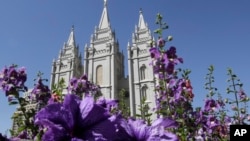Issues of race and diversity with the Mormon faith have bubbled up again after the church selected three white men last weekend to fill vacancies on a high-level governing body — a disappointment to many who hoped for an infusion of diversity.
On Friday at a conference at the University of Utah, a series of panels will explore the status of blacks in a religion that didn't allow men of African descent in the lay priesthood until 1978 and still has a void of black leaders.
Scheduled speakers include religious scholars, black Mormons in regional leadership levels and one of the highest-ranking black leaders in religion: Joseph Sitati of Kenya. He sits on a second-tier governing body of The Church of Jesus Christ of Latter-day Saints called the Quorum of the Seventy.
"It's an opportunity to do what Mormons on a congregational level tend not to do: Talk about race," said Paul Reeve, a University of Utah history professor who helped organize the event.
The conference is part of the university's Mormon studies initiative launched in 2010 to examine a religion that plays a key role in Utah and has a presence across the country and world. Past events have focused on the role of women and intellectuals in Mormonism.
The Utah-based religion doesn't provide ethnic or racial breakdowns of its members, but scholars say blacks make up a small portion of the 15-million member global faith.
About 3 percent of Mormons in the United States are African-American, the Pew Research Center estimated in 2009. About 5 percent of all worldwide members are of African descent, estimates Matt Martinich, a member of the LDS church who analyzes membership numbers with the nonprofit Cumorah Foundation.
A prominent part of the panel discussions Friday is likely to be an essay published by the church in December 2013 that offered the most comprehensive explanation of why the church previously had barred men of African descent from the lay clergy. If was the first time church leaders disavowed the ban that was lifted in 1978 after the church president said he had a revelation it was time for the change. "Church leaders today unequivocally condemn all racism, past and present, in any form," the essay said.
Outside church scholars called it a landmark moment. Though Mormon scholars over the years had written much of what is in the posting, they said it was noteworthy coming from church headquarters in Salt Lake City.
The lack of black leaders in the religion persists, though.
The top 15 leaders of the religion — including the president, his two counselors and the Quorum of the Twelve Apostles — are all white men. Only one, Dieter F. Uchtdorf, is from outside the U.S. He was born in Czechoslovakia and raised in Germany.
There aren't any blacks either on the next-level leadership group, the seven-member presidency of the Quorum of the Seventy. But there are two minorities: Ulisess Soares of Brazil and Gerrit W. Gong, an Asian-American.
In the body of the first Quorum of the Seventy, two men are black: Sitati and Edward Dube of Zimbabwe. There are no black leaders from the U.S.
The dearth of black leaders is an issue for recruitment and retention, Reeve said.
"When you don't have a representation of people who look like you, the perception can quite easily be: That's a white church," Reeve said. "It leads to feelings that somehow I don't belong if I'm a black person."
Don Harwell, president of a black Mormon support group called the Genesis Group, said much progress has been made over the last four decades but that problems persist with black Mormons not being understood by their white bishops or regional leaders.
"There are a lot of great men called as bishops and stake presidents, but sometimes they just don't understand the problems that somebody who is black has," said Harwell, of Cottonwood Heights, Utah.




